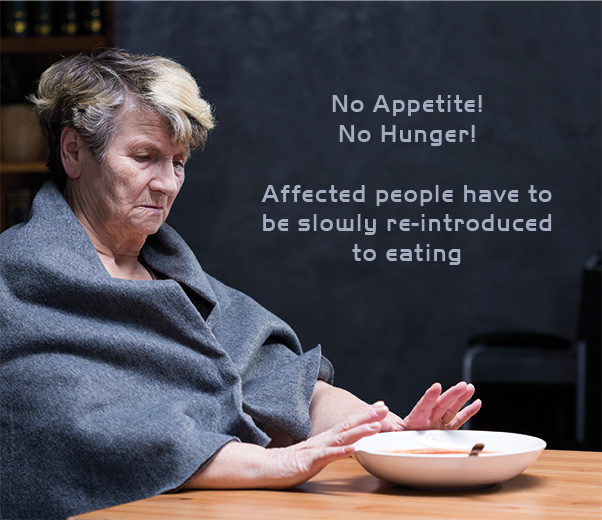No appetite, no hunger
„Enjoying food is the key to health and zest for life“
Affected people report in counselling interviews and group meetings again and again that they no longer feel hunger or appetite.
But what is hunger or appetite?
Hunger is a physical sensation which we feel and which leads us human beings to take in nutrition. The biological function of this sensation “hunger” is to feed the body with sufficient nutrients and energy, to ensure that body and mind can function well.
Pain and reduced levels of sensory perception can lead to the destruction of the natural sensation of hunger and to affected persons forgetting or refusing food.
The consequences of insufficient nourishment can be malnourishment, large weight loss, complete exhaustion, listlessness, ascites (water in abdomen) and tumour cachexia (emaciation).
Affected persons report that their movement is restricted. Their joy of life and quality of life disappear rapidly, treatment and therapies often don’t agree with them.
Are hunger and appetite the same thing?
I say no!
Appetite is the delight and the demand for nourishment. It depends a lot on moods and feelings. Strong sensory stimuli, a delicious food smell and tasty foodstuffs can stimulate the appetite.
Unpleasant smells, too full plates and unsightly meals can destroy the appetite. You often hear the sentence: “The nasty smell made me lose my appetite”. Disgust often follows.
Appetite steers us to the choice of foodstuffs which we eat and helps us to digest food and drink well.
The body signals its own needs. For instance, it’s possible that someone who has a gall bladder or liver illness develops a strong aversion to fat and therefore reduces the intake.
An aversion to food smells or disgust at some dishes which were previously well-enjoyed often arise with illnesses of the gastrointestinal tract. It’s quite possible that someone’s taste suddenly changes completely and, instead of sweet things a preference for sour or salty things develops or food tastes bitter and insipid (tasteless). Affected people don’t want to eat anything at all anymore, they lose their delight in food.
That’s why one should try to re-introduce affected people, who have lost their hunger and appetite, to food. Insisting that people eat and sentences like: “Try a few spoonfuls at least!” don’t help. The affected people feel pressurised to do something that they cannot, simply because they are ill. And then a feeling of helplessness in the face of excessive demands raises its head.
Instead we should all together be searching for ways of whetting their appetites, so that these affected people find delight again in food. We should definitely avoid strong smells, too full plates, meals which are presented in an unappetising manner and visiting the kitchen during cooking. We should always remember that presentation makes a huge difference.
Sometimes the people suffer from a fear which robs them of their appetites. Therefore any pain occurring before or after meals must be clarified with the doctor.
Quality of life
Food and drink are important factors for our quality of life, but is that really the case in real life? A high quality of life means something different for ill people than for healthy people. The proximity to life, to the partner, to children and grandchildren and to the job or profession are things which contribute to the quality of life. Everybody decides himself what constitutes life quality, for example a feeling of security, family, garden, travel, food, friends, animals and reading.
A high quality of life should be the most important thing for everyone
What priority do food and drink have?
Correct nutrition and hydration are vital. A human being can only live for a few days without liquid and only a few weeks without food. A good nutritional situation can be compared to a house foundation; if it is lopsided or even crumbly, it will be difficult to build a house. That’s why an adequate and balanced diet and the correct intake of enzymes (when necessary) is important. The whole body of a person who is malnourished and weak tilts to a position which is almost not curable. The person continuously loses strength, mobility and vigour. He or she becomes listless, lethargic and apathetic. Any necessary operations, therapies and treatments can often not be undertaken because of malnourishment and then the desired success is doesn’t appear. The operations which are undertaken are often accompanied by more complications, chemotherapies are more difficult to bear and more side effects are felt. The affected person often finds him/herself in a state of total exhaustion.
At TEB we try to re-activate people’s appetites. They shouldn’t be allowed to forget eating!
For this reason we offer a special cooking course (promoted by Mylan), in which ill and healthy people cook together. They learn how to make delicious food and also how to present it attractively. At TEB we also know how important and meaningful it is, never to forget the topic of nutrition. It is a fact that almost everyone who suffers from pancreatic cancer experiences some problems with food during the illness. It’s advisable to weigh regularly (BIA rating). The doctor who is treating should definitely be consulted when a weight loss of 5% within the last six months occurs. Enteral or parenteral nourishment is often necessary. Nutrition and physical movement are very, very important in our eyes and in our experience. They can lengthen the life time considerably and improve life quality.
Katharina Stang





